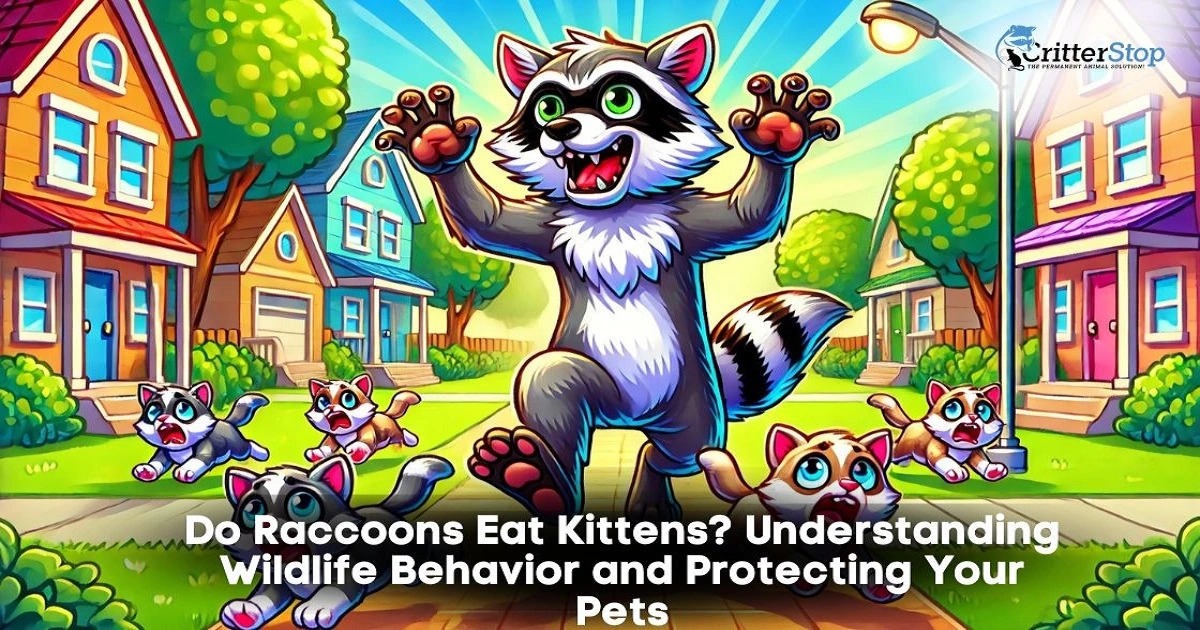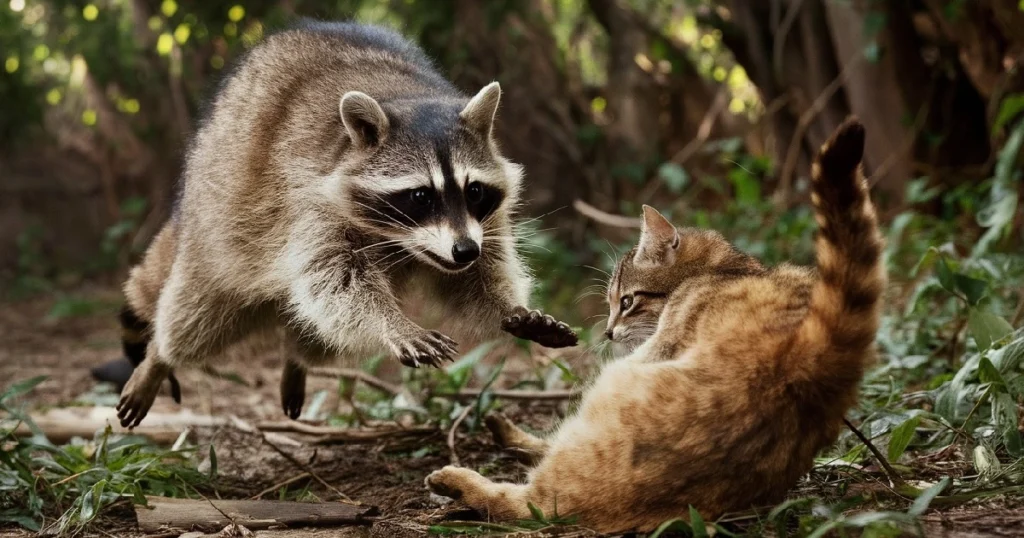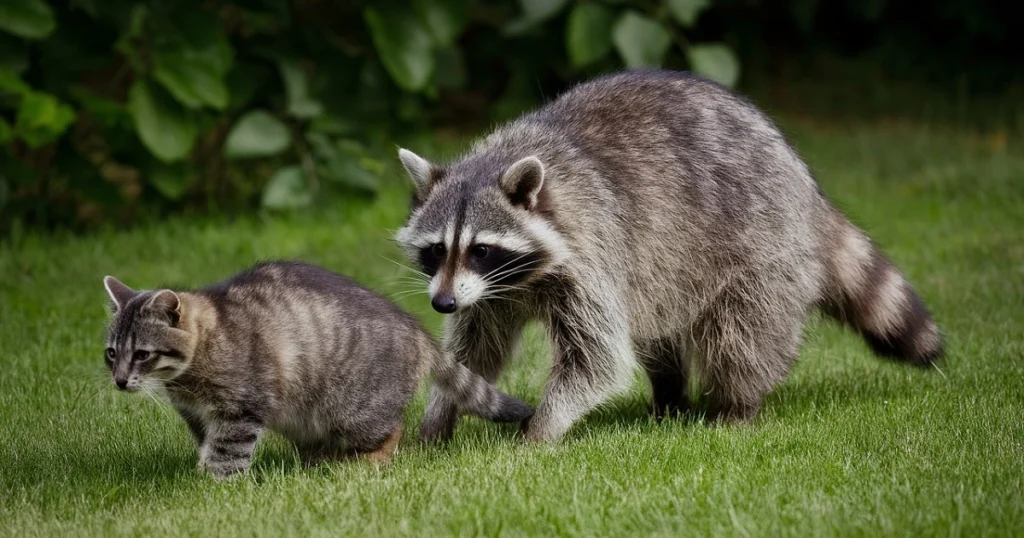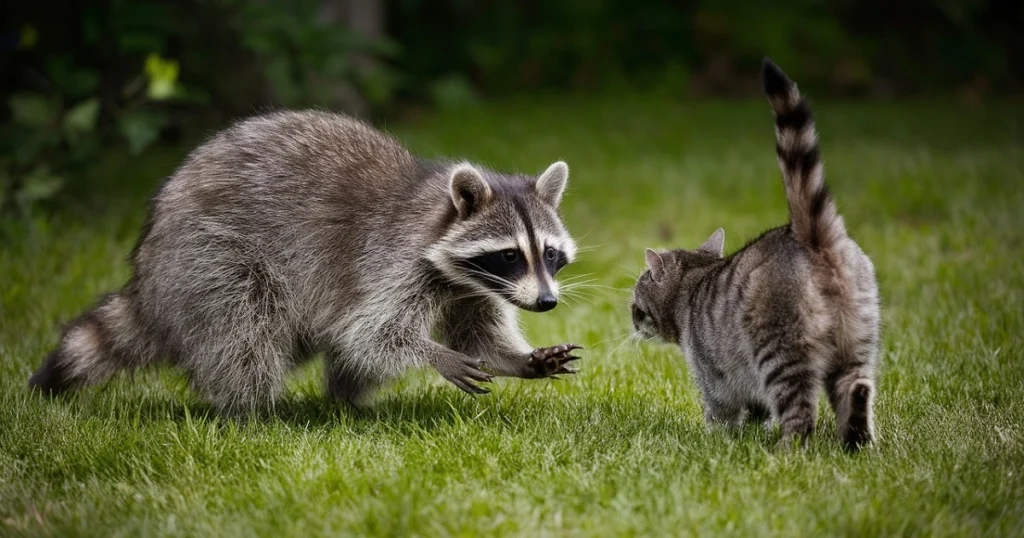
Raccoons, with their distinctive masked faces and dexterous paws, are known for their adaptability and omnivorous diet. However, concerns about raccoons preying on domestic pets, particularly kittens, often arise among homeowners. Let’s delve into this topic to provide clarity and expert advice on raccoon behavior and effective pet protection strategies.

Raccoons (Procyon lotor) are widespread across North America, thriving in diverse habitats from forests to urban environments. They are opportunistic feeders, consuming a varied diet that includes fruits, nuts, insects, small mammals, birds, and eggs. Raccoons can explore and exploit human environments for food and shelter because they are known for their intelligence and curiosity.
In the wild, raccoons target small animals such as mice, squirrels, and rabbits. While they are not typically predators of healthy adult cats or dogs, raccoons attacking kittens or small pets have been documented, especially in urban or suburban areas where human development intersects with wildlife habitats.
Raccoons' opportunistic nature may lead them to scavenge for food in residential areas, sometimes conflicting with pets. They may perceive small animals like kittens as potential prey, mainly if they are vulnerable or unattended outdoors. While such incidents are rare, they underscore the importance of proactive pet management and wildlife awareness.

In urban settings, raccoons often search for food in garbage bins, compost piles, and pet food left outdoors. This proximity to human dwellings increases the likelihood of encounters with domestic pets. Pet owners should take precautions to minimize conflicts and ensure their pets' safety.
At Critter Stop, we prioritize the safety and well-being of pets while promoting peaceful coexistence with wildlife. Here are some expert tips to safeguard your pets from raccoons:
Install secure fencing around outdoor spaces to prevent raccoons from entering.
Seal off potential entry points, such as gaps under decks and sheds.
Always supervise pets when they are outdoors, especially during dawn and dusk.
Use leashes or keep pets within enclosed areas to prevent wildlife encounters.
Store pet food indoors and in sealed containers to avoid attracting raccoons.
Clean up outdoor feeding areas promptly to remove food traces.
Use wildlife-proof bins with tight-fitting lids to prevent raccoons from accessing garbage.
Avoid overfilling bins, and ensure lids are securely fastened.
Seal potential entry points to your home, including attic vents and chimneys.
Use sturdy materials like steel mesh to block access to vulnerable areas.
Critter Stop, a leading provider of humane wildlife removal services, offers comprehensive solutions to mitigate wildlife conflicts. With a reputation for high-quality work and exceptional customer service, Critter Stop ensures the safe removal and relocation of raccoons and other pests from residential properties. For a free inspection and expert advice on wildlife management, call Critter Stop at (214) 234-2616.

While raccoons generally do not directly threaten healthy adult cats or dogs, precautions should be taken to protect vulnerable pets, such as kittens, from potential wildlife encounters. By understanding raccoon behavior and implementing proactive measures, homeowners can create a safer environment for their pets while fostering harmony with wildlife.
For further information on wildlife management and effective Raccoon removal strategies in Frisco, visit Critter Stop today. Critter Stop's expertise and dedication ensure peace of mind for homeowners facing wildlife challenges.
Raccoons, renowned for their adaptability and scavenging habits, are a common concern for pet owners, particularly regarding their interactions with kittens. Below, we address key questions to clarify raccoon behavior and strategies to safeguard your pets.
Raccoons are opportunistic feeders that consume various foods, including small animals like mice and birds. While they primarily target easier prey, raccoons have been reported preying on kittens, especially in urban areas where human and wildlife habitats overlap.
In natural environments, raccoons typically focus on small mammals, insects, fruits, and nuts as their primary food sources. While they may scavenge for food in residential areas, direct predation on healthy kittens in the wild is less common but not unheard of, particularly if food resources are limited.
Raccoons may exhibit defensive behaviors if confronted, especially if they perceive a threat to themselves or their young. However, direct attacks on healthy kittens are rare unless provoked or if the raccoon feels threatened.
Raccoons generally avoid confrontations with larger animals unless they feel threatened or cornered. They are more likely to scavenge for readily available food sources rather than actively seek out and kill kittens as prey.
While raccoons are omnivorous and opportunistic, their dietary preferences typically lean towards smaller mammals, birds, and insects. The likelihood of raccoons targeting and consuming baby kittens depends largely on environmental factors and food availability.
Raccoons exhibit natural hunting instincts but are likelier to target smaller prey such as rodents and insects. Direct predation on kittens is rare and usually occurs when raccoons are desperate for food or feel threatened.
In extreme hunger or competition for resources, raccoons may resort to scavenging for food in residential areas, potentially leading to encounters with domestic pets like kittens. Proper waste management and securing food sources can mitigate these risks.
Raccoons are typically nocturnal and avoid confrontations with larger animals unless defending themselves or their young. Attacks on kittens by surprise are uncommon and are more likely to occur when raccoons feel threatened or startled.
At Critter Stop, we understand the complexities of wildlife interactions and offer expert wildlife management services to ensure the safety of your pets. For a free inspection and personalized advice on protecting your home from wildlife intrusions, call Critter Stop at (214) 234-2616. Trust our reputation for high-quality work and exceptional customer service in North Texas.
Visit our Critter Library and learn more about our furry friends